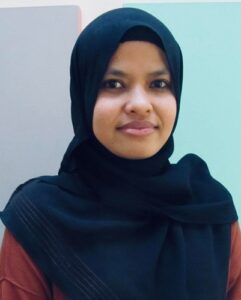Winners PCF
2024


Feba Sukmana & Lara Nuberg
New publication of Kartini’s letter
The Javanese regent’s daughter Kartini corresponded with various Dutch pen pals in the early twentieth century about the injustices suffered by Javanese women. She advocated against polygamous marriage and arranged marriages, and also aimed for education for Javanese women from the noble class.
After her sudden death, a selection of this correspondence was published in the collection Door duisternis tot licht (1911), compiled by J.A. Abendanon, head of the Dutch Department of Education. The publication led to the establishment of Kartini schools as part of Dutch Ethical politics. As of 2023, the letter collection is increasingly difficult to obtain, making Kartini’s ideas less accessible to a wide audience.
With the new publication of Kartini’s letters, Lara Nuberg and Feba Sukmana reevaluate Kartini’s letters through a postcolonial lens. Did Kartini solely focus on the unequal treatment of Javanese women, viewing the Netherlands as a shining example of women’s rights? Or was she more critical, holding a mirror to the Netherlands as a colonial ruler? To answer these questions, Sukmana and Nuberg will retrieve all of Kartini’s letters from the archives, inventory and compare them with the collection Door duisternis tot licht. They will then make a new selection and write two introductory essays. This new publication is scheduled to be published in March 2025 by De Geus Publishing.
Feba Sukmana is a journalist, writer and moderator. She was born and raised in Jakarta, Indonesia. She completed her master’s degree in Dutch Studies at Leiden University in 2008, specialising in Dutch-Indies literature and postcolonial literary studies. Feba’s work is at the intersection of language, journalism, gender and literature. She currently works as an editor at Erasmus Magazine, the journalistic platform of Erasmus University.
Lara Nuberg studied history at the University of Amsterdam and has since worked as a writer, speaker, organizer, and moderator. She publishes on colonial history, identity, and memory culture. Additionally, she is a teacher and coordinator for the educational program Koloniale Sporen in mijn buurt and co-hosts De Indische Boekenpodcast with Ricci Scheldwacht.

Maarten Manse
Book manuscript on the topic of taxation and governance in colonial Indonesia
This project aims to finalize and resubmit a book manuscript on the topic of taxation and governance in colonial Indonesia, to be published with Brill in the Verhandelingen van het KITLV series. Based on the author’s PhD thesis, the book innovatively explores the implications of taxation for the local dynamics of Dutch colonial governance. Shifting focus to peripheries, the study challenges prevailing academic understandings of colonial statecraft in Indonesia. It presents new evidence revealing how the introduction of new taxes was never the result of a linear ‘modernization’ project, but rather a sluggish process of trial and error, in which colonial and indigenous methods of taxation and social organization overlapped and coexisted. Apart from a ‘tool’ of finance, administration and governance, cunningly wielded by state officials, taxation also provided a platform to indigenous populations to challenge and contest the state, rendering the state itself into something that in the eyes of many could still be negotiated.
The manuscript is set to be resubmitted by July 2024, with an expected publication in early 2025. Additionally, the project includes two research articles on legal pluralism and the role of tropes in maintaining colonial power.
Maarten Manse is currently a postdoctoral researcher at Linnaeus University in the project ‘Imperial Expansion and Intercultural Diplomacy‘. Previously, he lectured at Vrije Universiteit in Amsterdam and at Utrecht University, after having completed his PhD thesis at Leiden University in 2021. His research interests cover the history of colonialism and decolonization of Southeast Asia (with a special focus on Indonesia), and in particular mechanisms of colonial governance, state-formation and state-society interaction. The coming years, he will continue doing postdoctoral research on a personal grant from the Swedish Research Council, focusing on how Southeast Asian linguistic patterns and writing traditions influenced international treaty-making practices.

Adieyatna Fajri
From Ruins to Revival: Unveiling the legacy of colonial violence, heritage, and current cultural identity formation of Banten
The demolition of the Banten royal palace by the colonial government in 1808, de facto, marked the end of the long-respected Islamic suzerainty in Banten. This demolition, while exposing the insidious nature of the colonial project, has profound ramifications for community resilience, heritage, and cultural identity formation. The significance of the Banten pusaka confiscated by colonial regimes and the ruins of the kraton continues to inspire the ongoing debate over the cultural identity of the newly formed autonomous Banten province.
Through the lens of post-colonial analysis, the research aims to disentangle the argument concerning the persistent influence of the colonial gaze. It seeks to identify the resourcefulness and narrative production of the colonial past, highlighting the Bantenese people’s ability to resist and reject colonial narratives. In this research, three distinct layers of analysis—historical, archaeological, and ethnographic—are independently conducted yet closely intertwined. The aim is to explore the dynamics of time and the mobility of the objects, archaeological remains, and the narratives associated with them. In this regard, the values and significance attributed to objects and archaeological remains have played a fundamental role in sustaining the imagination and re-invention of present-day Bantenese cultural identity.
Adieyatna Fajri is a PhD researcher at NIOD Institute of War, Holocaust, and Genocide Studies and the Groningen Institute of Archaeology, University of Groningen. He conducted his research within the framework of the Pressing Matter project, addressing the issues of values and ownership of colonial objects. After receiving his master’s degree in global and colonial history from Leiden University in 2013, he joined as teaching staff in the Archaeology Department of Universitas Gadjah Mada in 2016. His primary research interests lie in the fields of colonial archaeology, Islamic archaeology, and the politics of heritage in Indonesia.

Talisha Schilder
Contemporary practice of indigenous tattoo traditions in the Indonesian Archipelago
This critical ethnographic research project explores the contemporary practice of indigenous tattoo traditions in the Indonesian Archipelago. While Indonesian tattoos almost went extinct under the Dutch colonial regime’s (1602-1949) anti-headhunting policies and Christian missionaries, as well as President Suharto’s New Order (1966-1998), one can observe a revival of Indonesian tattoo art in present-day Indonesia. This project aims to understand how the designs, meanings, narratives, and practices of Mentawaian and Bornean tattoos – intertwined with Dutch and Indonesian cultural politics – have persisted, changed or disappeared over time.
To understand such complex cultural dynamics, it uses theories and methods from a range of academic disciplines and fields, especially Interpretative Anthropology, Cultural Studies, Ecofeminism, Political Geography, and History. The methods of data collection are conversational interviewing, participant observation, photography, audio-visual recording and auto-ethnographic journaling. New archival material is presented through snapshots of embodiment, especially photographs, audio-visual material, sound pieces of tattooing practices and storytelling accounts – conceptualising the tattooed body as an embodied archive. Inspired by Battaglia, Clarke and Siegenthaler (2020), such archival material offers an opportunity to deconstruct the colonial paradigm of older archival materials from European explorers through the counter-gaze of the research subjects.
Talisha Schilder is a critical ethnographer in training at Leiden University. After completing the MA International Relations cum laude with a specialization in cultural politics, she is finalising the Research Master Asian Studies (2022-2024) to prepare for her future PhD position. Under the supervision of Dr. Elena Burgos Martinez, her thesis explores the contemporary practice of Indonesian tattoo traditions. Her previous research work has been published and presented at various academic conferences such as the General ECPR Conference 2022 and the Young Scholars’ Symposium in Asian Art 2023. Talisha’s research interests include tattoos, the body, indigeneity, cultural politics, and intersectional (eco)feminism with a regional focus on Southeast Asia, especially the Muslim Malay World. A note on the researcher’s personal background and positionality. Being a heavily tattooed, queer feminist of mixed heritage (including Indonesian) in academia, Talisha values working towards equity, diversity and inclusion in her work and interpersonal relationships.

Myra Abubakar
Depiction of women in traditional Acehnese literature during the colonial period
This study looks into the depiction of women in traditional Acehnese literature during the colonial period, with a special emphasis on the narratives presented in two major Aceh’s hikayat: Hikayat Prang Sabi and Hikayat Prang Gompeuni. The research seeks to identify the complex gender dynamics present in these stories, taking into account the Acehnese gender hierarchy, oral storytelling traditions, and the rich tapestry of ancient cultural norms prevalent during that time.
The project aims to reveal the interplay between social institutions, gender roles, and the literary context of traditional Acehnese writings. Furthermore, its objective is to examine the historical and cultural factors that have influenced the depiction of women and examine the impact of colonial powers on the portrayal of gender roles in traditional Acehnese narratives. Finally, the research aims to examine the current significance of these literary narratives, specifically in relation to the depiction of female heroes in modern-day Aceh.
The project also includes close readings of the selected primary texts, examining language, themes, and cultural nuances. The study encompasses a literature review, archival research, fieldwork, translation, analysis, and scholarly article writing. This project endeavours to contribute valuable insights into the representation of women in traditional Acehnese literature during the colonial era, shedding light on the complex interplay between literature, gender roles, and colonial influences in Acehnese society.
Myra is a doctoral candidate at the Australian National University School of Culture, History, and Language. Her thesis A Study of Female Heroism in Indonesia examines the evolution of female heroism in Indonesia from the nineteenth century to the present, exploring its cultural and political significance. As a lecturer, she taught Indonesian language, literature, and culture at ANU and various institutions in Canberra. Presently, Myra is a recipient of a couple of fellowships and grants for her research on national heroes in Indonesia, including the Evans Fellowship at the University of Cambridge and the Philippus Corts Fund. She is also a Visiting Researcher at the National University of Singapore’s Department of History and a Research Fellow at the Leibniz Institute for Educational Media Georg Eckert Institute. For further information, contact Myra at [email protected].